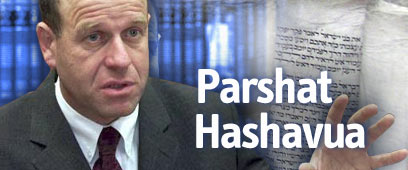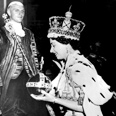

Queen Elizabeth’s coronation – monarchy not a Jewish invention
Photo: AP
Parshat Shoftim is one of the most important ones in the bible. The biblical legislator lays the ancient basis – in the form of guiding principles and not necessarily binding details – for the relationship between the regime and sovereign on the one hand, to the individual and individual rights on the other.
It is no wonder then that many of the Jewish political doctrines draw their roots from this source:
“Judges and officers shalt thou make thee in all thy gates…and they shall judge the people with righteous judgment.”
This is not the time or place to discuss the ancient justice system, but it is clear we are not talking about a readymade, up-to-date system that can be implemented today, at once, as a genuine “operating system” for a current-day country.
It has no modern separation of powers, as the police officers and judges are standing side by side. There is no prison in the bible, and the individual rights and freedoms it speaks of are vastly different than the ones we know and require today.
Moreover, the rights of the king – the sovereign – are highly limited and hinge on burdensome duties. And still, because of the complex whole comprising relations between the king and his kingdom and subjects, the words serve as an invitation for a deeper comprehension of democracy through the bible.
Monarchy’s source in the portion is fascinating: “…and shalt say: 'I will set a king over me, like all the nations that are round about me." When today I hear the fiery arguments that “democracy is not a Jewish system because it is not mentioned in the bible,” I nod my head in sadness in the face of the fools the instigators. After all, monarchy is also not our original invention.
If monarchy can be imported, why not democracy?
We will explicitly read about this at synagogues the world over this Friday: Only if we want a king, that is, prefer a flesh and blood monarchy over God’s rule, only then does the Torah allow us to take a king. And what kind of king? Like all the nations that are around us.
In other words, there is no unique Hebrew notion of a monarchy – we have an imported monarchy. As is the custom in other kingdoms and peoples, the foreigners and the gentiles “round about me.”
And if we’re allowed to import a monarchy whose maladies are known in advance, why aren’t we allowed to import democracy? After all, both of them were born in other nations. Both have drawbacks, but one of them, democracy, has clear advantages over monarchy.
It’s a fact: When a king sins, or his family sins, the entire nation pays the price. On the other hand, when the people’s government errs, it can be replaced by a better one.
And the commentators, many of the finest ones of all times, do not hesitate to come out against the simplistic perception of an Israelite king. Openly and publicly they adopt models that are much more popular, open, and liberal.
Don Yitzhak Abarbanel, among the most important leaders of historic Spain’s Jewish community, he who served in the courts of kings and knew more than anyone in his time about human monarchy, explicitly ruled that it is not proper for the king to appoint Israelite judges, but rather, the peoples should appoint them, arguing that the bible aims to tell us that every tribe should appoint the most appropriate judges in every town.
Similarly, in the 19th century, Rabbi Naftali Zvi Yehuda Berlin writes that there is no decree to appoint a king until the people say they want the leadership of a king.
Those are two examples among many. One, Abarbanel, who viewed the corrupt and corrupting institute of monarchy as the negative source of past destruction.
Meanwhile, the more modern Berlin, who boldly, originally, and wisely took the simplistic image of monarchy (which some long for nostalgically, without understanding, knowing or thinking,) and emptied it of powerful substance, by handing over its authority to the people, who elect and appoint.
If this is not democracy from the Torah, what is it?















